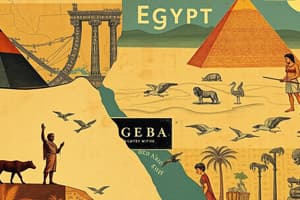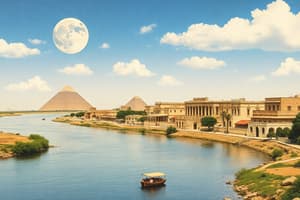Podcast
Questions and Answers
What was a primary effect of conquests, diplomatic relations, and trade on Egyptian history?
What was a primary effect of conquests, diplomatic relations, and trade on Egyptian history?
- They significantly impacted political structures and cultural developments. (correct)
- They resulted in the complete abandonment of literature and arts.
- They led to a decrease in agricultural productivity.
- They isolated Egypt from neighboring civilizations.
Which of the following was NOT a major achievement of ancient Egyptian civilization?
Which of the following was NOT a major achievement of ancient Egyptian civilization?
- Development of complex surgical procedures. (correct)
- Construction of monumental pyramids and temples.
- Advancements in writing systems.
- Sophisticated irrigation systems.
What marked the decline of the New Kingdom in ancient Egypt?
What marked the decline of the New Kingdom in ancient Egypt?
- A rebirth in artistic expressions and literature.
- An increase in internal stability and governmental strength.
- A surge in technological innovations.
- The gradual fragmentation of the Egyptian state. (correct)
Which civilization ruled Egypt after the decline of the New Kingdom?
Which civilization ruled Egypt after the decline of the New Kingdom?
How has the legacy of ancient Egyptian civilization continued to influence the world?
How has the legacy of ancient Egyptian civilization continued to influence the world?
What role did the Nile River play in the development of Ancient Egyptian civilization?
What role did the Nile River play in the development of Ancient Egyptian civilization?
Which practice was NOT central to Ancient Egyptian beliefs about the afterlife?
Which practice was NOT central to Ancient Egyptian beliefs about the afterlife?
Which social group was at the top of the Ancient Egyptian social hierarchy?
Which social group was at the top of the Ancient Egyptian social hierarchy?
How did the geographical landscape of Egypt influence its settlements?
How did the geographical landscape of Egypt influence its settlements?
What was one function of hieroglyphics in Ancient Egypt?
What was one function of hieroglyphics in Ancient Egypt?
Which characteristic does NOT describe the family structure in Ancient Egyptian society?
Which characteristic does NOT describe the family structure in Ancient Egyptian society?
Which musical aspect played a significant role in Ancient Egyptian culture?
Which musical aspect played a significant role in Ancient Egyptian culture?
Which of the following best describes the historical divisions of Ancient Egypt?
Which of the following best describes the historical divisions of Ancient Egypt?
Flashcards
Nile River's role
Nile River's role
The Nile River was crucial to ancient Egyptian civilization, providing fertile land through annual flooding and enabling trade and communication.
Egyptian religion
Egyptian religion
Ancient Egyptian culture was deeply religious, focusing on gods, the afterlife, and elaborate rituals.
Hieroglyphics
Hieroglyphics
A complex writing system used by ancient Egyptians to record religious beliefs, history, and administration.
Egyptian Social Hierarchy
Egyptian Social Hierarchy
Signup and view all the flashcards
Egyptian Burial Practices
Egyptian Burial Practices
Signup and view all the flashcards
Ancient Egyptian History Eras
Ancient Egyptian History Eras
Signup and view all the flashcards
Deserts' role, Egypt
Deserts' role, Egypt
Signup and view all the flashcards
Predictable Flooding
Predictable Flooding
Signup and view all the flashcards
Pharaoh's Power
Pharaoh's Power
Signup and view all the flashcards
Egyptian Achievements
Egyptian Achievements
Signup and view all the flashcards
External Influences
External Influences
Signup and view all the flashcards
Decline of New Kingdom
Decline of New Kingdom
Signup and view all the flashcards
Ancient Egypt's Legacy
Ancient Egypt's Legacy
Signup and view all the flashcards
Study Notes
Geography of Ancient Egypt
- Egypt's geography profoundly shaped its civilization. The Nile River, a vital artery, flooded annually, depositing fertile silt that nourished the land.
- The surrounding deserts, particularly the Sahara and Arabian deserts, acted as natural barriers, protecting the Nile Valley from invasion and promoting a sense of isolation.
- The Nile's predictable flooding allowed the development of a highly organized agricultural system.
- The river's course facilitated trade and communication between different regions.
- Variations in the land's elevation and resources influenced settlement patterns and economic activities.
Ancient Egyptian Culture
- Ancient Egyptian culture was deeply religious, with a pantheon of gods and goddesses associated with natural forces and human activities.
- Belief in the afterlife, mummification, and the construction of elaborate tombs and pyramids reflected this.
- Hieroglyphics, a complex writing system, served diverse functions, including recording religious beliefs, historical events, and administrative matters.
- A highly structured social hierarchy existed, with pharaohs at the apex, followed by priests, scribes, and artisans.
- Daily life for commoners revolved around agriculture, crafts, and domestic activities.
- Art, expressed through sculptures, paintings, and architecture, often portrayed religious subjects and royal power.
Ancient Egyptian Traditions
- Religious festivals and rituals played a prominent role in daily life, marking agricultural cycles and commemorating deities.
- Music and dance were integral parts of religious ceremonies and social gatherings.
- Family structures were generally patriarchal, with the father as the head of the household.
- Marriage customs varied based on social status, but marriage was often viewed as a bond uniting households.
- Children played a recognized role in family life, often assisting with domestic tasks and learning societal values.
- Burial practices were elaborate and reflected beliefs about the afterlife, featuring specific rituals, mummification techniques, and lavish tomb decorations.
- Ancient Egyptians developed sophisticated methods of medicine, drawing on empirical knowledge and religious beliefs.
Ancient Egyptian History
- Egyptian history is often divided into eras, such as the Old Kingdom, Middle Kingdom, and New Kingdom, each marked by distinct political, social, and cultural characteristics.
- The pharaohs ruled as absolute monarchs, controlling vast resources and wielding considerable power.
- Conquests, diplomatic relations, and trade with neighboring civilizations significantly impacted Egyptian history.
- Major achievements: Construction of monumental pyramids and temples, advancements in writing systems, developments in mathematics and astronomy, and sophisticated irrigation systems.
- Periods of instability and foreign invasion also occurred, impacting political structures and cultural practices.
- The decline of the New Kingdom marked the gradual fragmentation of the Egyptian state, eventually culminating in foreign rule by the Persians, Greeks, and Romans.
- The legacy of ancient Egyptian civilization continues to inspire archaeological research, artistic representation, and cultural interpretations worldwide.
Studying That Suits You
Use AI to generate personalized quizzes and flashcards to suit your learning preferences.




